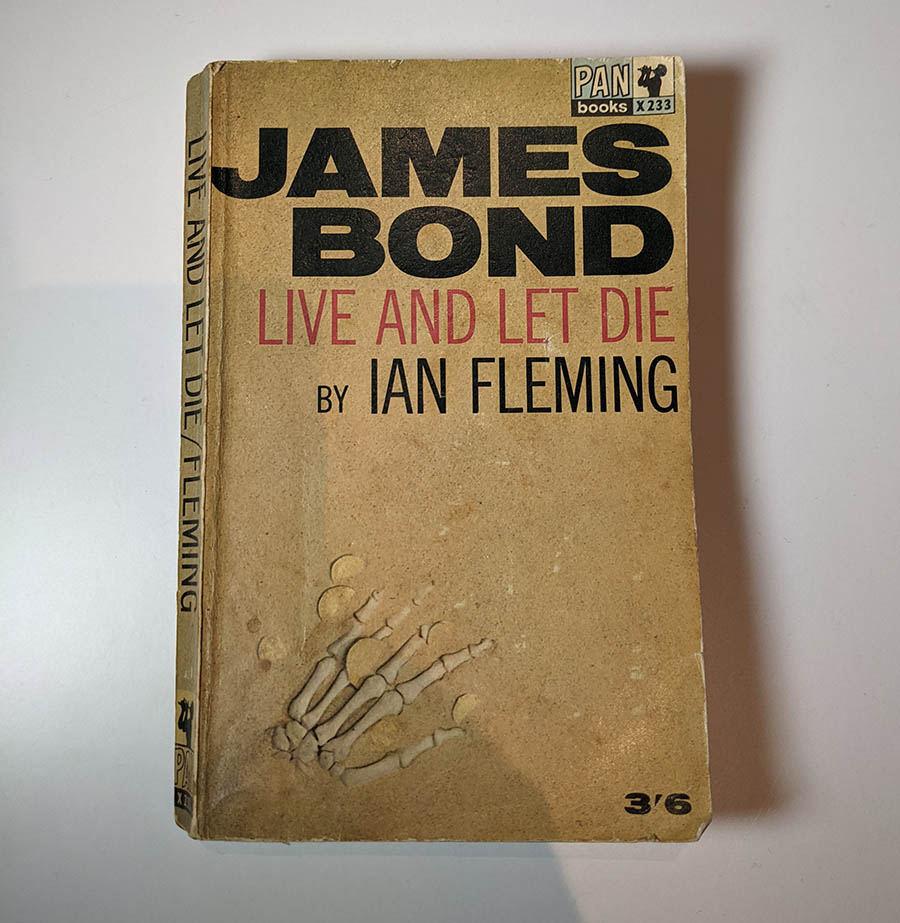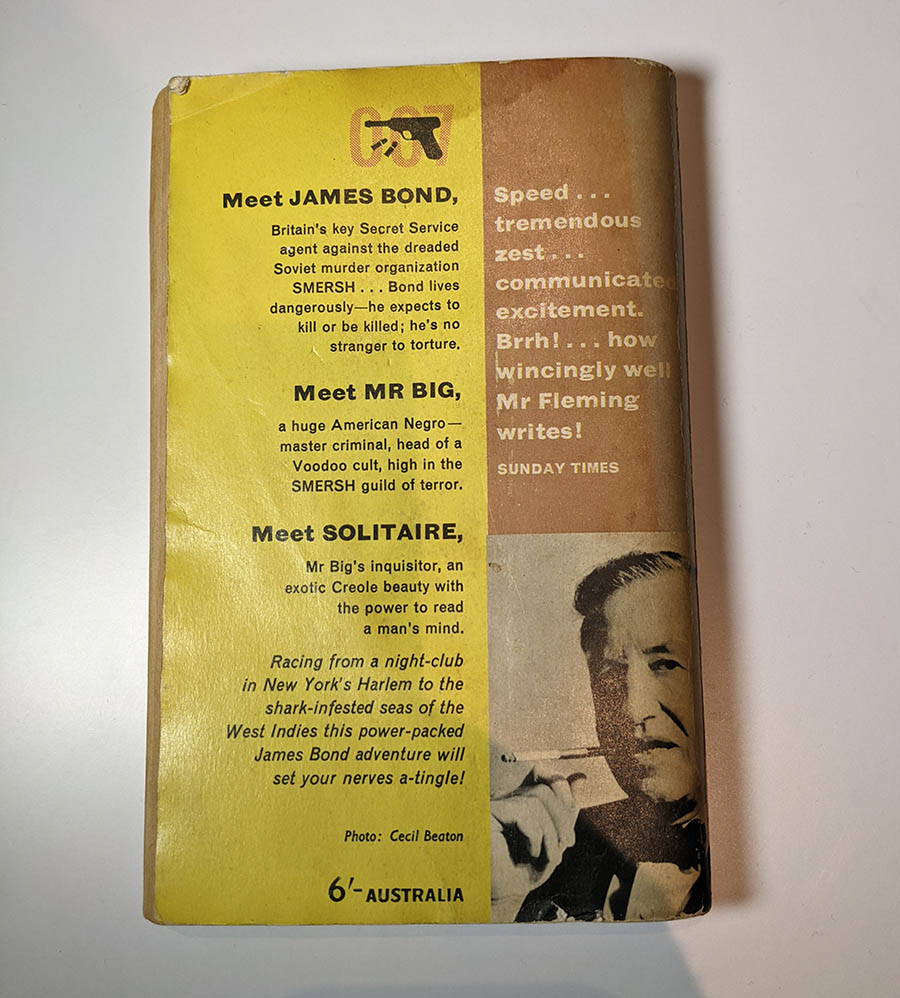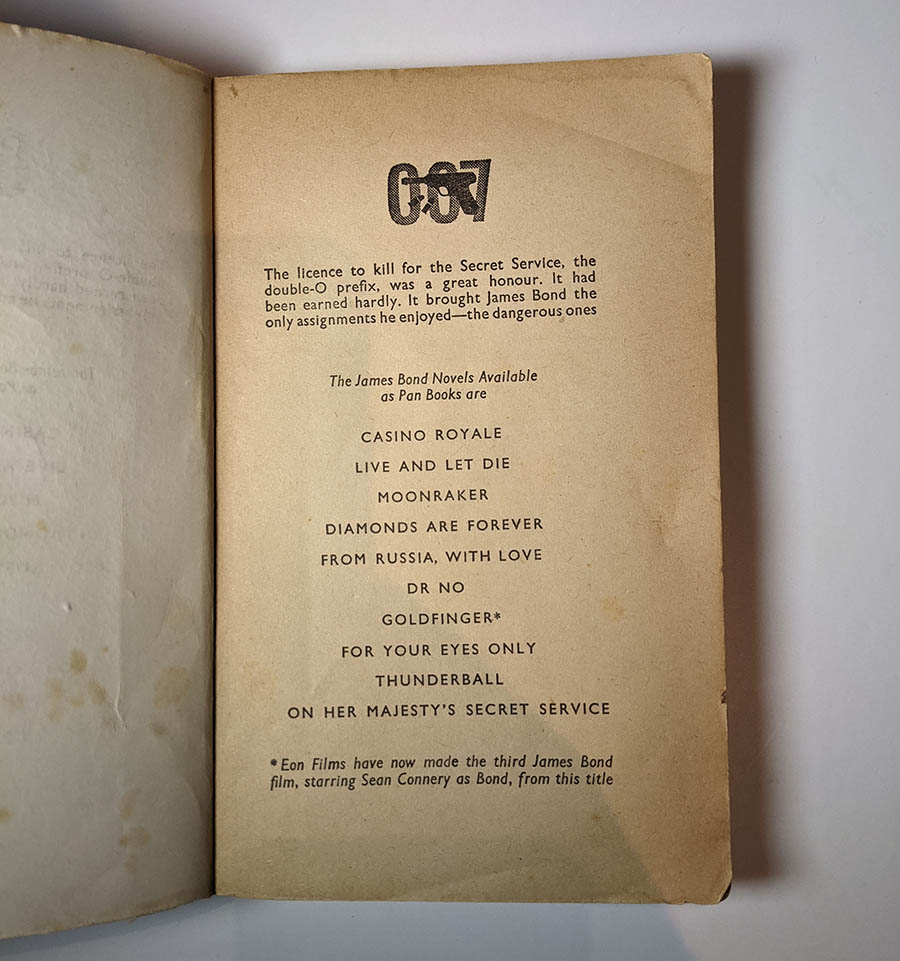After recently reading and reviewing Casino Royale, I continue my James Bond Challenge with Live and Let Die, the second Bond novel written by Ian Fleming, in 1954. Originally I was hoping to read one Bond novel each month, but as it is now the end of June, that’s obviously quite gone to plan! I’m actually nearly finished the third book already though, and am hoping to catch up a bit over the summer.
As ever, I’m not very good at writing an in-depth review and critical analysis, so instead I write down notes and remarks as I go through the book. Here is my thought process and observations as I read Live and Let Die. One thing that I had heard about this book was regarding the racist language, even more than most Bond novels. So I was interested to see how that aspect was handled.



- The words ‘negro’ and ‘negress’ were mentioned matter of factly in the first five pages, so it was pretty clear early on the sort of language and descriptions that were going to be used.
- I found it interesting that were was a footnote on p8 referencing the previous novel, Casino Royale. I’d only really seen footnotes like that used in comics before. Never really in novels.
- Bond finds himself in America for the majority of this book, and early on Fleming seems to get in a fair few anti-American digs. Just little digs about the food, and the fashion, and the colloquial words etc.
- Again we have a flashback about meeting M. I quite like that narrative tool that Fleming uses. I wonder if it will become a regular tactic in every novel.
- p13 – ‘The desireable Miss Moneypenny, M’s all powerful private secretary’. I’ve noticed this about Fleming. He’s certainly not above sexualising women, and sometimes making them damsels to be rescued by Bond. But he’s also capable of showing women of power too in different ways. He describes Moneypenny here as ‘all powerful’ and in the first three Bond books he has two female spy characters. In Moonraker which I’m reading right now, he describes Gala Brand as being able to break Bond’s arm if she so desired. I’m sure the pendulum swings more into the misogyny side of things, but I’m interested to see how Fleming handles women in all the rest of the novels.
- Let’s address the racism issue in Live and Let Die now. I’m still learning what kind of a writer Fleming is. I’m still wondering if he was particularly racist himself, or if just some his characters were, and/or if he was just using commonplace language used in those un-woke times. There are certainly a tonne of expressions, names, language, and settings in this book that could be called racist today. I’m sure a lot of it might be described as institutional or casual racism. Fleming does often seem to say positive things about different races, and for example saying good things about the nightlife in Harlem and the music there etc. It’s just all done in the casual racism language of the day, which isn’t particularly palatable today, to say the least. He actually bigs up the ‘negro races’ in several places, such as saying ‘And the negro races are just beginning to throw up geniuses in all the professions – scientists, doctors, writers. It’s about time they turned out a great criminal (Mr Big).’ But the main part for me that is really cringeworthy is when he writes in the voices of the black characters and he writes their colloquialisms and accents in a phonetic way. I can just imagine Fleming sitting there, smoking a pipe, and trying to sound like a black man on his typewriter. I found it very cringeworthy when reading it back. But yes there are definitely some terms used later on in the book, which must have just been a commonplace term back in those days, which are quite uncomfortable to read now. There is some nautical geography term called a ‘n***erhead’ which is mentioned at least three times. I mean, really? Go home 1950s, your racist.
- Interestingly, for some reason I assumed that Solitaire was black. She was introduced with all of the black characters with Mr Big and she said she came from Haiti. I was thinking during the whole book that it was very open minded of Fleming to have Bond have a romantic relationship with a black woman in only his second book, and in the 1950s. But I only realised later on that actually she has pale skin, and therefore it’s almost that Bond is the white savour that rescued her from the bad black men. Hmmm. Quite a different situation in retrospect.
- I have to say I really enjoyed reading about Bond and Felix Leiter enjoying the nightlife in Harlem. And I don’t think I detected any racism at all from the characters themselves during these scenes. It was all just the terms that Fleming was using in places.
- P18 – Here we have lots of talk of Japs, Chinamen and Negroes. It really does make it sound like a different world back in the 1950s. I guess it was. Also on P18 it says that there were apparently only 250 million black people on the planet and that was a third of the white population. Firstly I found that ratio surprising, but also it really made me wonder how many less people there must have been on the planet. There’s nearly 8 billion now. I checked and in the 1950 there were only 2.5 billion. It really is scary how fast the population is increasing!
- There’s a fun section across p24-25 where Leiter gives Bond a reminder of how to be American, talking about asking for the ‘check’ rather than the ‘bill’, and ‘cab’ v ‘taxi’ etc. “The English word to be avoided at all costs, added Leiter, was ‘Ectually’.” Bond actually has several anti-American jibes, so the casual, or not so casual, racism from Fleming extends to America too!
- p36. Interesting spelling of ‘Lootenant’. Maybe Fleming was just phonetically spelling out the American pronunciation of it? Or a little aside joke to his Royal Navy buddies that might be reading the book?
- p38. Bond says that his policy is “Live and let die”
- This is a great line from Fleming – ‘In front of his eyes, the rain came down in swift, slanting strokes – italic script across the unopened black cover that hid the secret hours that lay head.’
- There is a chapter actually called ‘N***er Heaven’. I don’t even want to write that on my blog, and yet it’s a chapter title in 1954. I think in the novel it’s the nickname of a nightclub, but still. Like I said, a different time.
- I like noting what drinks Bond has in the books. In this book he drinks a LOT of Haig Scotch.
- p51-52 – As I mentioned above I really enjoyed reading about the cool nightlife in Harlem, including references to Sugar Ray’s and the Savoy Ballroom. I wonder if Fleming had travelled there himself or if he had just heard accounts from other people.
- p81 – ‘Bond shot straight into the screaming mouth and the man’s head crashed against the side window.’ – Brutal
- p87 – Universal Export is mentioned. I don’t remember this being mentioned in Casino Royale, so this could be the first mention of the cover name for Bond’s employers.
- p89-ish – It was interesting to hear about all the trouble that Bond and Leiter’s night out in Harlem caused to the police, the CIA and the FBI. It was refreshing to actually hear about side effects like that, rather than just pretending spy stuff happens in a bubble. And also cool to see that Leiter and Bond were both pretty chilled about it all.
- Bond smokes three packs of cigarettes a day. Yikes.
- I learnt in this book that Bond loves chicken sandwiches. I’m pretty sure he orders them twice in the same day at one point. Fleming really does love letting us know exactly what Bond is eating and drinking at every, single, meal.
- Speaking of drinking, on the train to Florida, Bond orders an Old Fashioned and stipulates ‘Old Grandad’ bourbon. This is another Bond drink that I will have to try to emulate
- Bond ‘loved trains and he looked forward with excitement to the rest of the journey’. So Bond’s a bit of a trainspotter, eh? He even slags off British Railways on the next page.
- Bond and Solitaire have a surprisingly frank conversation on the train. Bond says, “And we’ll have to be up at four in the morning anyway. So there simply isn’t time to begin making love to you now.” Good logistical work there, Bond. Straight to the point.
- Around p118 Fleming starts slagging off American diners, American scrambled eggs, and then moves on to slagging off old people. It just all feels a bit negative and unnecessary.
- SPOILERS – There’s a great chapter title, ‘He disagreed with something that ate him.’ I assume that wasn’t a well known joke back then. Although such a funny chapter title really did lead the way to a very shocking situation. Felix Leiter, who we had just gotten to really get to know, during Bond and his big night out in Harlem, gets half eaten by a shark and loses an arm and a leg! I knew that in the movies Leiter is badly attacked by a shark in Licence to Kill, but that’s like the 17th Bond film, so that I thought we would get more than 1.5 Fleming novels with Felix having all his appendages. Apparently not. Hopefully he will make some sort of return in future novels. I imagine he must, otherwise why would he have such a recurring role in the movies.
- Chapter 14 ends with a great line. ‘Bond took out his gun and cleaned it, waiting for the night.’
- I’ll say again, so much of these books is just detailing exactly what Bond has to eat and drink. Makes me very hungry.
- Apparently Bond is a little bit afraid of flying, when things get turbulent in the air. Good to know. When the aeroplane is bouncing around he starts to philosophise with some great lines. ‘You start to die the moment you are born. The whole of life is cutting through the pack with death. So take it easy. Light a cigarette and be grateful you are still alive as you suck the smoke deep into your lungs.’
- Bond has a nightmare and ‘whimpered and sweated in his sleep.’ No, I’m sorry, Bond does not whimper.
- Bond has a week’s training regime in Jamaica which made me smile. ‘By the end of the week, Bond was sunburned and hard. He had cut his cigarettes down to ten a day and had not had a single drink.. Spartan, Bond. Spartan. He really does mean business.
- Another cool final line to a chapter on p191. ‘The stars winked down their cryptic morse and he had no key to their cipher.’
- SPOILER – It’s impressive and sensible, but still, when you read it, it does feel cold when Bond plans to drown Solitaire first and then use her dead body weight to drown himself, before being eaten alive.
- Yet another great final chapter line on p241. ‘The first tears since his childhood came into James Bond’s blue-grey eyes and ran down his cheeks into the bloodstained sea.’
- SPOILER? – Not sure if I missed something but I didn’t quite get the reference of the very last line, “What about my back?” she said.
All in all, this novel gets some stick, for its racial undertones, and quite rightly so in some places. But there is also a lot to like about this book. I really enjoyed the whole ‘Bond in the US’ situation, and the night out in Harlem with Felix, and the overall friendship between Bond and Leiter. The end scene was pretty powerful too.
It’s hard to score these novels when I’m still learning Fleming’s writing style. But I did prefer Casino Royale. Here is my ranking and scoring so far. Both of those attributes are liable to be fluctuate, as I continue reading more Fleming novels.
Current ranking and scoring out of 10
Casino Royale – 8.5
Live and Let Die – 7


My James Bond book and film challenge – and a Bond timeline | Retromash
Nov 7, 2021 -
[…] Live and Let Die by Ian Fleming | Retromash […]
Ben Williams
Nov 4, 2022 -
Did you ever figure out the “what about my back” line?
Ian Moore
Jan 19, 2022 -
I’m just reading this, as a break from Jack Reacher. You definitely know it’s from the 50’s, but have to accept it was a different era. The jive talking in the club was definitely cringy, plus not sure what Nigger Heaven is, other than racist!
But I am enjoying the book, enjoying reading the early James Bond. After this it will be Goldfinger.
Cheers.
Moonraker by Ian Fleming | Retromash
Oct 7, 2022 -
[…] reading and reviewing Casino Royale, and Live and Let Die, and after about a year’s hiatus due to ‘real life stuff’ getting in the way, I […]
Victor Kumps
Jan 27, 2024 -
Let me know if you find out
Dan
Apr 2, 2024 -
Yup – I’m here too, trying to find out about that ending “What about my back” line!?! It’s a little weird to read here about how shocked you are that the words negro and nigger and such were in common use at that time. Reallllly?!? Oh MY, Oh my WORD. I am embarrassed reading the Kindle PC-fied version where “black people” is used SO often. Feels very awkward and spotlit. I suppose they’re gonna have to go back and capitalize all those lower case “black” people pretty quick now, too. Or maybe we should just burn ALL books written before 1970? Way too many inappropriate words and ideas in those books.